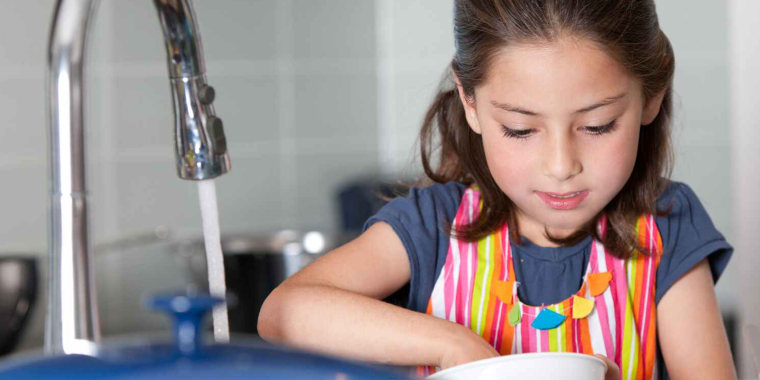Responsibility is something all children need to learn. By helping your child develop responsibility, you are helping her reach her full potential. Responsibility involves making decisions, being trusted, and learning to take credit for one’s actions—whether good or bad. Taking responsibility is not just about how the choices your child makes affect her, but also how her choices and actions affect others. Being responsible can help your child feel important and like she is contributing to both the family and the community. One of the best ways to teach your child about responsibility is to model the behavior for her. Look out for friends and neighbors, volunteer in your community, and be dependable. Arrive to gatherings on time, admit when you’re wrong, and apologize for mistakes. If your child sees you doing these things, she is much more likely to do the same.
Assigning tasks at home is a great way to teach your child about responsibility. At this age, she can help fold laundry, take out the garbage, set and clear the table, and even help out with some food preparation like washing produce and preparing a salad. Let her know specifically what is expected of her and give her honest feedback about how well she has done afterward. Be sure she realizes that these actions are genuine contributions to the household, allowing others to do other necessary things. Charts hung on the refrigerator or wall can help remind children what is expected of them. Include your child in making these charts and in deciding which task will be her responsibility. This will make her feel more involved in the process and more invested. Talk about the consequences of completing and not completing one’s tasks. Praise or rewards for completing chores can be more effective at this age than punishments for incomplete tasks.
Start talking with your child about money. You may also want to provide your child with a weekly allowance not tied to her responsibilities around the house. Author and consultant Faye de Muyshondt says that an important lesson to teach your child is that one-third of her allowance should be saved, one-third spent and one-third donated.
Making sure that children this age start to interact independently is a great way to build their self-confidence. You can help nurture your child’s independence by teaching her how to pack or how to be on time to school and activities. It’s a meaningful lesson to provide children with the tools to be independent someday.
A pet is a great way to teach responsibility. While not all families can keep some animals at home because of allergies or other reasons, having your child take care of his own goldfish can be a fantastic lesson in responsibility. Ensure that he takes responsibility to clean the bowl and feed the fish daily. If you have to step in and help out because your child is not on top of his responsibilities, use it as a teaching opportunity.
Parent Toolkit resources were developed by NBC News Learn with the help of subject-matter experts, including Maurice Elias, Director, Rutgers Social-Emotional and Character Development Lab; Jennifer Miller, Author, Confident Parents, Confident Kids; and Michele Borba, Author and Educational Psychologist.
